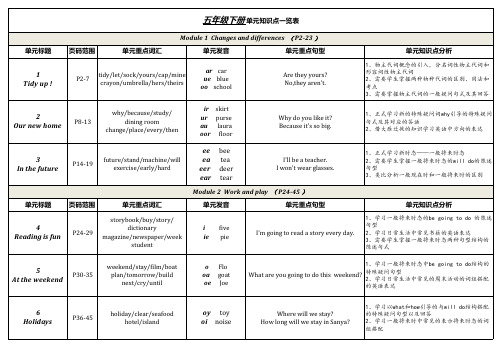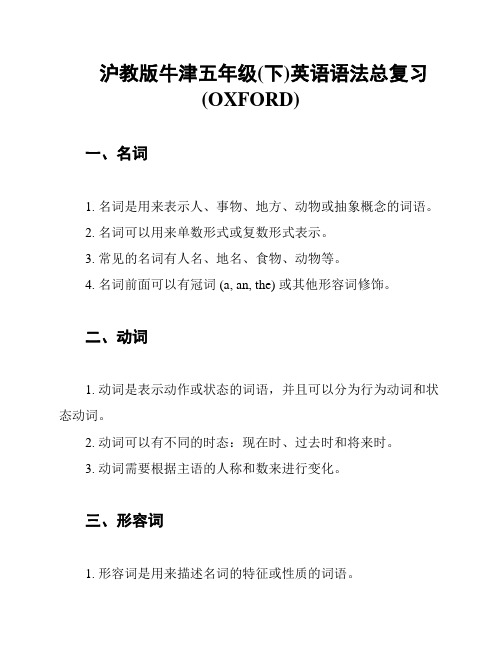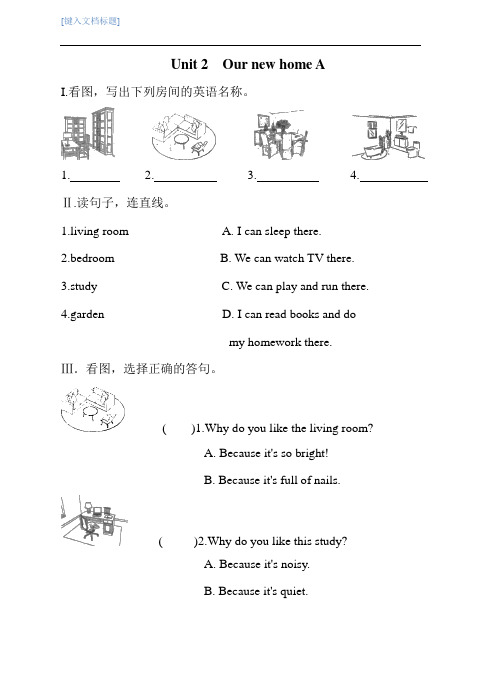牛津英语深圳版五年级下第二单元知识点复习
牛津版五年级英语下册Unit2Howdoyoucometoschool(第2课时)课件

Your school is too big. 拓展:用于肯定句句末,其前加逗号时,意为:“也、还”,等同于also;
also置于实意动词之前。肯定句否定句都可用 I know the answer, too. = I also know the answer. 我也知道这个答案。
Exercise
She lives in a small town near New York.(对划线部分提问) __W__he_r_e_d_o_e_s _s_he__li_v_e _n_e_ar_N__ew__Y_o_r_k_? ______________________ Do you often play football? (肯定回答) __Y_e_s_,I_d_o_._________________________________________ Su Hai goes to school by taxi.(对划线部分提问) _H__o_w_d_o_e_s_S_u_H__a_i _go__to__sc_h_o_o_l?________________________ Tim does his homework at home ( 改成否定句 ) _T_i_m__d_o_es_n_'t_d_o__hi_s_h_o_m_e_w_o_r_k_a_t_h_o_m_e__________
always一直;usually通常; sometimes有时;never从不。
•1、人才教育不是灌输知识,而是将开发文化宝库的钥匙,尽我们知道的交给学生。 •2、一个人的知识如果只限于学校学习到的那一些,这个人的知识必然是十分贫乏的2021/10/152021/10/152021/10/1510/15/2021 4:13:58 PM •3、意志教育不是发扬个人盲目的意志,而是培养合于社会历史发展的意志。 •4、智力教育就是要扩大人的求知范围 •5、最有价值的知识是关于方法的知识。 •6、我们要提出两条教育的诫律,一、“不要教过多的学科”;二、“凡是你所教的东西,要教得透彻”2021年10月2021/10/152021/10/152021/10/1510/15/2021 •7、能培养独创性和唤起对知识愉悦的,是教师的最高本领2021/10/152021/10/15October 15, 2021 •8、先生不应该专教书,他的责任是教人做人;学生不应该专读书,他的责任是学习人生之道。2021/10/152021/10/152021/10/152021/10/15
沪教牛津版五年级下册单元知识点一览表

1、学习以what和how引导的与will do结构搭配 的特殊疑问句型以及回答 2、学习一般将来时中常见的表示将来时态的词 组搭配
单元标题
7 Open day
页码范围
单元重点词汇
P46-51
meet/school gate/art room hall/finally/meeting room
show
五年级下册 单元知识点一览表
单元标题
1 Tidy up !
页码范围
单元重点词汇
Module 1 Changes and differences ( P2-23 )
单元发音
单元重点句型
P2-7
tidy/let/sock/yours/cap/mine crayon/umbrella/hers/theirs
1、正式学习新时态——一般将来时态 2、需要学生掌握一般将来时态的will do的陈述 句型 3、类比分析一般现在时和一般将来时的区别
单元知识点分析
1、学习一般将来时态的be going to do 的陈述 句型 2、学习日常生活中常见书籍的英语表达 3、需要学生掌握一般将来时态两种句型结构的 陈述句式
You should take some medicine. You shouldn't go to bed late.
1、学习日常生活中常见的不适症状以及需要注 意事项的英语表达 2、进一步学习以情态动词should引导的表示建 议的祈使句型
Module 4 Things we enjoy ( P68-87 )
1、学习日常生活中常见的节假日的英文表达
11 Chinese fesivals
P74-79
festival/important/call end/village/last
沪教版牛津五年级(下)英语语法总复习 (OXFORD)

沪教版牛津五年级(下)英语语法总复习(OXFORD)一、名词1. 名词是用来表示人、事物、地方、动物或抽象概念的词语。
2. 名词可以用来单数形式或复数形式表示。
3. 常见的名词有人名、地名、食物、动物等。
4. 名词前面可以有冠词 (a, an, the) 或其他形容词修饰。
二、动词1. 动词是表示动作或状态的词语,并且可以分为行为动词和状态动词。
2. 动词可以有不同的时态:现在时、过去时和将来时。
3. 动词需要根据主语的人称和数来进行变化。
三、形容词1. 形容词是用来描述名词的特征或性质的词语。
2. 形容词通常用来修饰名词,用来给名词添加更多的信息。
3. 形容词在句子中通常位于名词之前。
四、副词1. 副词是用来修饰动词、形容词、副词或整个句子的词语。
2. 副词可以表示时间、地点、方式等不同的意义。
3. 副词一般位于动词或形容词之后,句子中的其他位置也可能出现。
五、代词1. 代词是用来代替名词或其他代词的词语。
2. 代词可以用来指代特定的人或事物,以避免重复使用名词。
3. 常见的代词有人称代词、物主代词和指示代词。
六、介词1. 介词是用来连接名词或代词与其他词语的词语。
2. 介词通常用来表示时间、地点、方式等不同的关系。
3. 常见的介词有 in, on, at, with, from, to 等。
七、连词1. 连词是用来连接词语、短语或句子的词语。
2. 连词可以用来连接并列的词语或句子,以及引导复合句等。
3. 常见的连词有 and, but, or, because, if, when 等。
八、冠词1. 冠词是用来限定名词的词语。
2. 冠词分为不定冠词 (a, an) 和定冠词 (the)。
3. 不定冠词用来表示泛指的意义,而定冠词用来表示特指的意义。
九、句子1. 句子是由单词和词组组成的表达完整意思的语言单位。
2. 句子可以分为陈述句、疑问句、祈使句和感叹句等不同类型。
3. 句子由主语和谓语构成,可以包含其他成分如宾语、定语、状语等。
五年级下册英语Module1Unit2Ournewhome教案沪教牛津版

五年级下册英语Module1Unit2Ournewhome教案沪教牛津版牛津深圳版英语五年级下册Unit2第1课时教学设计课题Ournewhome单元Unit2学科英语年级五(下)学习目标1.能听懂,会说why,because,diningroom,study,allday.等单词。
2.掌握核心句型--Whydoyoulikeit?及答语--Becauseit’ssobig.3.运用本单元的核心词汇和句型进行简单的情境交际。
4.培养学生学习英语的兴趣,调动学习积极性。
重点1.能听懂,会说why,because,diningroom,study,allday.等单词。
2.掌握核心句型--Whydoyoulikeit?及答语--Becauseit’ssobig.难点运用本单元的核心词汇和句型进行简单的情境交际,能够听、说、读、写目标句型。
教学过程教学环节教师活动学生活动设计意图导入新课一、Freetalk.出示图片,提出问题,引导学生进行讨论:Doyoulikeyourhome?Howmanyroomsarethereinit?Whatarethey?Whatdoyou doinit?二、Let’sread.看图,读一读图片中房间的单词。
Whatarethey?三、Let’ssay.看图,说一说你在各个房间可以做什么。
回忆并讨论有关房间的名词,并能配合同伴进行读一读,说一说的活动训练。
通过谈论话题,复习单词和话题,学生们在话题谈论过程中进入本单元的新内容。
讲授新课一、Listenandsay.1.Let’slearn.学习单词why,because,diningroom,study,allday.并以听读等形式进行学习掌握。
2.Fillandsay.播放课文图片并根据图片内容填写单词。
3.Let’splay.快速读出消失的单词,看谁读得快。
4.Lookandtalk.出示课文图片Sallyandherdadareattheirnewhome.DoesSallylikeherhome?Whatroomdoe sSallylike?Whyorwhynot?引导学生讨论相关内容并根据图片内容回答问题。
牛津深圳版五年级英语下册 Unit 2 Our new home 同步练习(含答案)

Unit 2 Our new home AI.看图,写出下列房间的英语名称。
1. 2. 3. 4. Ⅱ.读句子,连直线。
1.living room A. I can sleep there.2.bedroom B. We can watch TV there.3.study C. We can play and run there.4.garden D. I can read books and domy homework there.Ⅲ.看图,选择正确的答句。
( )1.Why do you like the living room?A. Because it's so bright!B. Because it's full of nails.( )2.Why do you like this study?A. Because it's noisy.B. Because it's quiet.( )3.Why do you like our garden?A. Because it's cool. We can sleep there at night.B. Because it's so big. We can play there all day! IV.连词成句。
1.do, why, like, you, it (?)2.big, so, it's, because (. )3.they, in, north, fly, spring (,)(.)4.so, why, wild, much, around, geese, do, move (?)V.读一读,给下列句子排序,在括号里写阿拉伯数字即可。
( )It's green.( )I like Nancy's home.( )Why?( )What colour is it?( )Do you like Nancy's home or Danny's home?( )Because the dining room is so big. I like the colour too.VI.按要求完成任务。
最新牛津上海版(深圳)五年级英语下册Unit 2《Our new home》(第一课时)公开课课件

The bookshelf is in the study.
New words.
dining room
ing dinner
dining room
We have breakfast in the dining room.
New words.
Which one is in the dining room?
Read and try to answer the questions. 1.Why does Sally like the living room? Because it’s so big! 2.Why does Dad like the study? Because it’s quite. He can read and write there. 3.Why do Peter and Paul like the garden?
Байду номын сангаас
I like our new home because… I like our new home because…
beautiful big quiet write read
Peter and I like our new home because…
Let’s talk.
a the study is quite. I can read and write there. b we can play in the garden all day! c the living room is so big! Why do you like our new home?
Why?
Because it’s Because… beautiful!
Yes, I do.
小学英语五年级下册(牛津上海版深圳)Unit 2《Our new home》公开课课件
Peter and Paul garden
play all day
Why? … likes/like the… because it …
… can …
This is their new home. And it is also their dream home. As you can see, their dream comes true finally.
Dream
Kitty’s dream home
I live in a house . It is at the foot of the mountain . There are seven rooms in it. It’s wonderful .
Kitty
Dream
Danny’s dream home
What do they like? Dad study quiet face south warm in winter cool in summer nice Mum and Sally living room Why do they like it? read and write watch TV
Dream
Wonderful Dream homes
Dream
in the city
in the town or the countryside
at the beach
Interesting Dream homes
Dream
in the sky
in the zoo
on the tree
on the sea
I live in a car . It is on the road . There are three rooms in it. It’s interesting .
五年级下册英语素材-Unit1-2知识点复习牛津译林版[知识点梳理]
五年级下册英语素材-Unit1-2 知识点复习牛津译林版五下U1、U2复习【教学目标】能够理解及掌握Unitl与Unit2两个单元的内容【教学重点】能够掌握"Why…?”和“Because….”句型的用法能够掌握“ Where…?”和“ How…?”的用法【教学难点】常见特殊疑问词的用法;助动词do/does的用法【教学过程】一、语法:(1)动词第三人称单数形式:在一般现在时中,当主语是第三人称单数时,谓语动词要使用第三人称单数形式,变形规则如下:―(2)常见特殊疑问词的用法:特殊疑问词是特殊疑问句的引导词,特殊疑问句的结构一般都是特殊疑问词+一般疑问句”。
特殊疑问句不能用y e s或n o来回答,而是要根据询问的特殊疑问词]意思用法what 什么冋东西whe n 什么时候问时间who 谁问人物whose 谁的问所属(3)助动词do/does的用法:助动词,顾名思义,就是帮助其他动词的。
在一般现在时中,作为助动词的do/does是没有词义的,do/does在句中的作用就是帮助构成一般现在时的疑问句和否定句。
也就是说,如果句中没有be动词或者情态动词而是行为动词(表示一个具体动作的动词),这个句子又要变形成疑问句或者否定句,那就要使用到助动词了。
句中有助动词的时候,所有的变形均由助动词do/does完成,行为动词都只使用原形。
助动词使用规则如下:—[第一人称单复数主语:第二人称单复数主语:第三人称单数第三人称复数1、陈述句:主语+行为动词原形+其他. 1、陈述句:主语+行为动词第三人称单数形式+其他.2、否定句:主语+ don' +行为动词原形+其2、否定句:主语+ doesn' +行为动词原形+他.其他.3、一般疑问句:Do+主语+行为动词原形+其3、一般疑问句:Does +主语+行为动词原形+他?其他?4、特殊疑冋句:特殊疑冋词+ 一般疑冋句?4、特殊疑冋句:特殊疑冋词+ 一般疑冋句?]此时一般疑冋句中的助动词是do 此时一般疑冋句中的助动词是does (1)结构:Why + be动词/助动词+主语+其他?Because + 主语+其他.(2)用法:why意思是“为什么”,用来询问对方原因;because意思是“因为”,常用于回答why引导的特殊疑问句,也可以单独使用。
新沪教牛津版五年级下册小学英语全册单元知识点小结
新沪教牛津版五年级下册小学英语期末复习(全册单元知识点小结)Module Changes and differences一、核心词汇1.名词性物主代词yours你的;你们的mine我的hers她的theirs他们的;她们的;它们的2.名词sock短袜 cap帽子crayon彩色蜡笔(或粉笔、铅笔)umbrella伞place地方future将来;未来machine机器exercise运动;锻炼;活动3.动词let让stand站;站住will将;将会4.副词why为什么then然后early早;提早hard努力地5.兼类词(双重词性)tidy整理;整洁的change改变;变化study书房;学习6.其他because因为every每;每个7.短语dining room餐室;餐厅二、拓展词汇1.名词nail钉子second秒(时间单位)mess脏乱;不整洁2.动词drop使落下;掉落stick粘贴;粘住3.形容词enough足够的more更多的4.副词twice两次easily容易地5.兼类词(双重词性)north北方;向北south南方;向南6.短语tidy up把……整理好(be) full of装满……;充满…… a few几个;一些wild goose大雁(复数wild geese) in the future将来in front of在……前面take a photo拍照wear glasses戴眼镜(be)weak in不擅长not … any more不再all day 一天到晚do exercise做运动三、核心句型1.— Are they yours?它们是你的?— No, they aren’t. 不,它们不是。
解读: 问句是一个一般疑问句,用来询问某物的归属,有肯定和否定两种回答。
举一反三: — Are these crayons yours?这些蜡笔是你的吗?— No, they aren’t. 不,它们不是。
新沪教牛津版五年级下册小学英语全册单元知识点小结
新沪教牛津版五年级下册小学英语全册单元知识点小结新沪教牛津版五年级下册小学英语期末复习(全册单元知识点小结)Module Changes and differences一、核心词汇1.名词性物主代词yours你的;你们的mine我的hers她的theirs他们的;她们的;它们的2.名词sock短袜cap帽子crayon彩色蜡笔(或粉笔、铅笔)umbrella伞place地方future将来;未来machine机器exercise运动;锻炼;活动3.动词let让stand站;站住will将;将会4.副词why为什么then然后early早;提早hard努力地5.兼类词(双重词性)tidy整理;整洁的change改变;变化study书房;学习6.其他because因为every每;每个7.短语dining room餐室;餐厅二、拓展词汇1.名词nail钉子second秒(时间单位)mess脏乱;不整洁2.动词drop使落下;掉落stick粘贴;粘住3.形容词enough足够的more更多的4.副词twice两次easily容易地5.兼类词(双重词性)north北方;向北south南方;向南6.短语tidy up把……整理好(be) full of装满……;充满…… a few几个;一些wild goose大雁(复数wild geese) in the future将来in front of 在……前面take a photo拍照wear glasses戴眼镜(be)weak in不擅长not … any more不再all day 一天到晚do exercise做运动三、核心句型1.— Are they yours?它们是你的?— No,they aren’t. 不,它们不是。
解读: 问句是一个一般疑问句,用来询问某物的归属,有肯定和否定两种回答。
举一反三: — Are these crayons yours?这些蜡笔是你的吗?— No,they aren’t. 不,它们不是。
- 1、下载文档前请自行甄别文档内容的完整性,平台不提供额外的编辑、内容补充、找答案等附加服务。
- 2、"仅部分预览"的文档,不可在线预览部分如存在完整性等问题,可反馈申请退款(可完整预览的文档不适用该条件!)。
- 3、如文档侵犯您的权益,请联系客服反馈,我们会尽快为您处理(人工客服工作时间:9:00-18:30)。
Unit 2 Our new home
【词组】
1. at their new home 在他们的新家 2. so big 非常大 3. read and write 读书写字 4. in the garden 在花园 5. all day 一整天 6. living room 客厅 7. dining room 餐厅 8. wild geese 大雁 9. busy life 繁忙的生活 lives生活(复数) 10. from one place to another 从一个地方到另一地方 11. change homes 搬家
12. twice every year 每年两次
13. fly north/ south 飞向北方/南方
14. in spring/ summer/ autumn/ winter在
春/夏/秋/冬季
15. move around 走来走去,四处流动
16. so much 达到这种程度
17. enough food 足够的食物
18. in the north/ south 向北/南飞
19. fly back 飞回来
【句型】
1. –Why do you like it? 你为什么喜欢它?
–Because it’s so big. 因为它很大。
2. What about you, Dad? 爸爸,你(的理由)呢?
3. Do you know why? 你知道为什么吗?
4. Because they can play in the garden all day! 因为他们能整天在花园里玩。
5. Wild geese have busy lives. 大雁过着忙碌的生活。
6. They change homes twice every year. 它们每年迁徙两次。
7. In spring, they fly north. In autumn, they fly south. 春天,它们往北飞。秋天,它们往
南飞。
【语法】
1. 本单元新学的特殊疑问词Why(为什么)用于询问原因。我们学过的其他常用的
特殊疑问词还有what(什么),where(哪里),how(怎么),when(什么时候)
等。
疑问词 意义 用法 例句
What
什么 问“是什么”、“叫什么”、“做什么” 1. What is it? 它是
什么?
2. What do you
usually do at the
Spring Festival?
你在春节时经常
做什么?
What time
什么时间(几点) 问具体几点钟 What time is it?现
在几点钟?
What colour 什么颜色 问颜色 What colour do you
like? 你喜欢什么颜
色?
What about 怎么样 用来征求意见或询问感受等,大多用于承接上面的同样问题? What about you,
Dad? 爸爸,你呢?
What day 星期几 用来问星期几 What day is it
today? 今天星期
几?
What date 什么日期 用来问具体的日期 What date is it
today? 今天几月几
号?
What … like 怎么样 用来问天气等,相当于how What’s the weather
like? 今天天气怎么
样?
When 什么时候 用来询问所有类型的时间 When do you get
up?你几点起床?
Where 哪里 用来问地点 Where are Peter
and Paul? Peter和
Paul在哪里?
Which 哪一(个,些…) 用来问具体的哪一个(些…) Which pair of shoes
do you like, the
white one or the
black one? 你喜欢
哪双鞋子,白色
的,还是黑色的?
Who
谁 用来问人物是谁 Who is the man? 这
个人是谁?
Whose 谁的 用来问东西是谁的 Whose socks are
these?这些是谁的
袜子?
Why 为什么 用来问原因 Why do you like it?
你为什么喜欢它?
How 怎么样 用来询问身体状况、心情、交通How do you get to
方式、天气等 school? 你怎么去上
学的?
How old
几岁 用来问年龄 How old is he? 他几
岁了?
How many 多少 用来问数量,后面必须接可数名词复数 How many book do
you have?你有几本
书?
How much 多少钱 用来问价格或不可数名词的量,后面可接不可数名词 1. How much is the
book? 这本书多
少钱?
2. How much water
is there in the
world? 世界上有
多少水?
How about
怎么样 用来征求意见或询问感受等,大多用于承接上面的同样问题,用法与what?about相同 How about you? 你
呢?
How often 多久一次 用来询问做某事的频率 How often do you
`go shopping? 你多
久购物一次?
3. twice every year表示“每年两次”,twice后面常与表示一段时间的次连用,如:
twice a year 一年两次 twice a month 一个月两次 twice a week 一周两次 twice
a day 一天两次
类似的次还有once(一次), three times(三次),four times(四次)等。
【作文】
My home
There is a big living room, a dining room, a kitchen and a study in my home. There are
four bedrooms in my home. There is a big supermarket near my home. I like my
bedroom because it’s big and beautiful.
